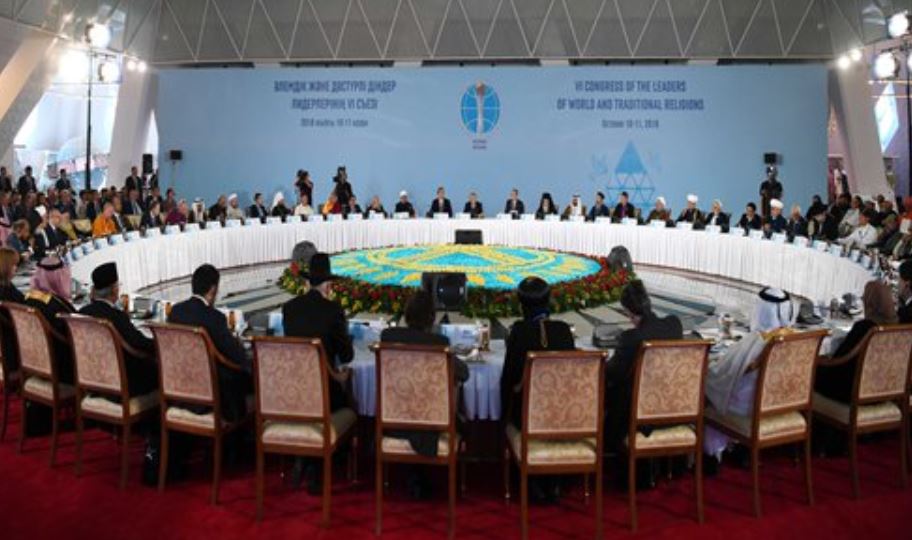
Representatives discuss how religion could help promote world peace and security at the Sixth Congress of the Leaders of World and Traditional Religions held in Astana, Kazakhstan, on October 10. Photo: (Photo: Kazakhstan Embassy)
As representatives from around the world gathered in Astana, capital of Kazakhstan, for a triennial congress of religious leaders, China's representatives highlighted the nation's religious policy and how it contributes to security and stability.
The Sixth Congress of Leaders of World and Traditional Religions, which was held from October 10 to 11, brought together 82 delegations from 46 countries with representatives of Taoism, Buddhism, Islam, Christianity, Judaism and Hinduism and members of religious and civic organizations.
The Chinese delegation has 15 members, including representatives from Taoism, Buddhism and Islam, who were invited to deliver speeches during the plenary sessions and panel discussions.
For Jin Rubin, deputy chairman of the Islamic Association of China, the mission this time is not only about getting updates from the world's religious leaders, but also exploring how China could play a bigger role and contribute more in promoting world security and peace.
"There are no major conflicts among China's religions and this is a very rare situation in the world. China's practice and experience are expected to be shared on the world stage, because the country has walked a path that guaranteed harmonious co-existence among diverse religions," Jin told the Global Times on the sideline of the congress.
The security and peace in China is a result of a social system that guarantees voices from religious circles are heard and responded to in the process of social governance, Jin said.
The major religions practiced in China - Buddhism, Taoism, Islam, Catholicism and Protestantism - have a total of nearly 200 million believers and more than 380,000 clerical personnel, according to a white paper titled China's Policies and Practices on Protecting Freedom of Religious Belief released in April.
The major religions all have their representatives in the National People's Congress, the country's top legislative body, and the National Committee of the Chinese People's Political Consultative Conference, China's top political advisory body.
The Chinese government also regards managing religious activity in accordance with law as a necessary move to ensure social stability and security, as religious believers are also members of civil society, Jin noted.
It's not about "controlling" or "restricting" religious activities, and this philosophy of governance has proved effective as China has never experienced major riots for religious reasons, said Jin.
Archbishop Tomash Peta from Astana told the Global Times, "China has the largest population in the world. It's important that the nation has more and more interactions with international society."
The concept of building a community with a shared future for humanity proposed by China has broken the boundary of ethnicity, culture, religion and ideology to achieve new opportunities for promoting world peace, Li Guangfu, chairman of the China Taoist Association (CTA), said during the congress.
Compared to Western values that prioritize "personal gains," China's philosophy stresses harmony among diverse groups and promoting goodness for all, Yang Shihua, deputy secretary-general of the CTA, told the Global Times.
"As representatives from China's religious sector, we need to further deliver this Oriental wisdom to the world," said Yang.
No political tricks
Participants of the congress also stressed the importance of preventing religion from being manipulated or used by politicians.
They noted that some irresponsible remarks or decisions from state leaders have brought "pain and fear" to religious believers.
Influential figures, such as US President Donald Trump, should show more restraint and respect in making comments or decisions on complex religious issues, a representative from the Muslim community in Russia, who preferred not to be named, told the Global Times.
Several riots have erupted and dozens of people were injured in December 2017 as Palestinian protesters clashed with Israeli security forces over Trump's controversial announcement that the US recognized Jerusalem as the capital of Israel.
In a declaration released at the end of the congress, representatives from religions and international organizations highlighted the need to reject all forms of manipulation of religion in political conflicts, and also reject manipulation of nationalism as well as claims of exclusivity.
"It's a hideous move if politicians use religion to win voters or attention from the media," William Vendli, general-secretary of the World Conferences of Religions for Peace, told the Global Times.
"It is also the oldest bad political trick on earth - unite by scapegoating, or uniting people by using or setting a common enemy, and this is why religions need to stand together and not allow themselves to be misused by any bad politician anywhere in the world," he said.
"The more that religious communities are united, the less easy it is to be divided or manipulated by political tricks," Vendli noted.


